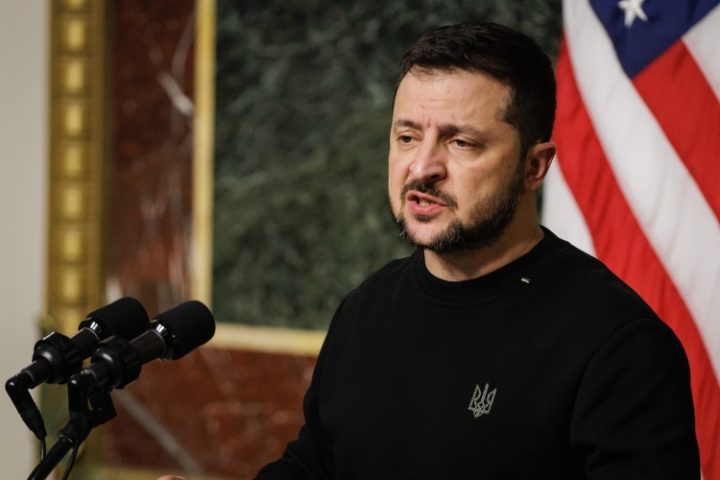
Western officials are exploring the potential removal of Ukrainian President Volodymyr Zelensky from power, the head of Russia’s Foreign Intelligence Service (SVR), Sergey Naryshkin, claimed on December 11.
The spy chief explained that there were various reasons for classifying Zelensky as undesirable, the most important being his lack of flexibility regarding Western interests.
According to the SVR chief, the West believes the Ukrainian leader has gone too far in reinforcing his image of an unrelenting hawk in Ukraine’s conflict with Russia. Should there be a need to “freeze” tensions with Russia, Zelensky would no longer be useful in any potential negotiations, Naryshkin added.
“According to the US intelligence services, with the way the situation in the Ukrainian theater of war is developing, the need [to freeze the conflict] may come soon,” the spy chief declared.
Moreover, Naryshkin elaborated that a substitution for Zelensky was being discussed owing to Zelensky’s unfulfilled pledges to defeat Russia on the battlefield, rampant corruption in Ukraine, and the leader’s disrespect when addressing foreign sponsors. Previously, Zelensky officially decreed that any talks with Moscow were impossible as long as Russian President Vladimir Putin remained at the helm.
Alternatives to Zelensky were discussed on the fringes of November’s meeting of NATO foreign ministers in Brussels, Naryshkin claimed. Potential options purportedly included the commander-in-chief of the Ukrainian armed forces, Valery Zaluzhny; military intelligence chief Kirill Budanov; the head of the president’s office, Andrey Yermak; or even Kyiv mayor and ex-boxer Vitaly Klitschko.
Following Kyiv’s botched summer counteroffensive, Ukrainian Colonel General Aleksandr Syrsky said on December 10 that the Russian army was constantly “conducting offensive operations along the entire front.”
Zaluzhny last month alluded to the situation on the front lines as a “stalemate,” acknowledging that there was no hope for a breakthrough. Those comments reportedly sparked an increasing rift between the general and the Ukrainian leader.
The Ukrainskaya Pravda news outlet also claimed that Zelensky has resorted to establishing alternative lines of command to give orders directly to officers such as Syrsky, as well as Nikolay Oleshchuk, commander of the air force, hence bypassing Zaluzhny.
While Zelensky’s office is said to find this convenient, the practice has disrupted the ordinary chain of command, much to Zaluzhny’s ire.
“It seems that Zelensky has two kinds of the ZSU (Ukrainian armed forces): the ‘good’ guys commanded by Syrsky and other favorites, and the ‘bad’ guys who answer to Zaluzhny,” the outlet cited a source close to the presidential administration as saying.
Zaluzhny sometimes only learns of what the military is doing from his subordinates, the report indicated. For months, Zelensky and Zaluzhny have been at odds with each other, with Kyiv’s flagging summer counteroffensive worsening tensions, according to insiders.
Ukrainskaya Pravda said Zelensky’s men, including chief of staff Yermak, have been escalating animosities owing to Zaluzhny’s perceived political ambitions since at least April 2022. They pressured the general into ditching an idea for a charity, which they believed could morph into a future political party.
However, Ukrainians’ trust in Zaluzhny exceeded that of Zelensky even last year, the report said. A recent public opinion poll conducted for the president’s office pointed out that in a hypothetical election, Zelensky would lose to Zaluzhny in a second-round vote, the news outlet continued.
Insiders have posited that Zaluzhny occasionally displayed his disdain with Zelensky’s leadership, including when he issued a veiled rebuff to the decision to fire all regional draft bosses in the summer after a major corruption scandal.
Shortly after hearing about the dismissals at a government meeting, Zaluzhny reported a sharp drop in conscription numbers all over Ukraine, a source told the outlet.
The general reportedly complained about civilian interference in military affairs to U.S. Secretary of Defense Lloyd Austin when Austin visited Kyiv last month. Zelensky subsequently learned of this, which “didn’t add trust” between the two Ukrainians, an insider disclosed.
The report further posited that although Zelensky had stopped arguing with Zaluzhny since Austin’s visit, he had instead resorted to sarcasm.
“The president asks something like, ‘how is our heroic advancement, did you retreat 200 meters?’ and Valery maintains an angry silence,” a source said, portraying exchanges between the pair.
In a recent interview, Yermak rebuffed talks about a Zelensky-Zaluzhny rift as Russian propaganda meant to jeopardize Ukrainian unity.
In late November, Mariana Bezuglaya, deputy head of the Ukrainian Parliament’s security, defense, and intelligence committee, admitted that Ukraine’s military leadership had no strategic plan for the year ahead in its ongoing conflict with Russia. The top brass wants to deploy tens of thousands of people every month, but has no clear understanding of what should be done with them, she acknowledged.
“The commander-in-chief of the Ukrainian Armed Forces has been unable to provide a [strategic] plan for 2024,” Bezuglaya wrote in a post on her Facebook page, referring to Ukraine’s Zaluzhny. The general has absolutely no concept of further conflict, she lamented, adding that he has no plan for any type of warfare, “either large or small … asymmetrical or symmetrical.”
The position of military leadership posed a major issue for the lawmakers planning the nation’s budget for the next year, the senior MP said. Problems had been mounting both in parliament and at the military leadership’s HQ at least since the summer, Bezuglaya divulged.
At that time, the Ukrainian military was in the midst of its much-touted but failed counteroffensive launched in early June. Kyiv’s troops did not gain any major territories but suffered heavy losses of personnel and equipment, including dozens of pieces of Western-supplied hardware.
Furthermore, Bezuglaya stated that Zaluzhny and other top commanders have so far not revealed any detailed plans for future training, troop rotation, or for the funding required for new brigades.
Rather, the Ukrainian military “simply said they would need to draft no less than 20,000 citizens every month,” the senior MP added.
“If the military leadership cannot provide any plan for 2024 and all their proposals for mobilization boil down to the fact that more people are needed without any … changes to the Armed Forces system, then this [military] leadership has to go,” Bezuglaya, who is a member of Zelensky’s Servant of the People party, said.
The presidential party’s faction in parliament refused to comment on Bezuglaya’s words when approached by the Ukrainian Pravda news outlet.
In early November, Zaluzhny admitted in an interview with The Economist that the situation on the frontlines was in essence a World War I-style stalemate. He also said that Russia had an advantage in that sort of warfare because of its superior personnel reserves and vast material resources. Zelensky subsequently dismissed Zaluzhny’s evaluation.
Zelensky also cautioned against the nation’s military leadership meddling in politics to avoid harming “the unity of the nation.”
Recently, Russia’s SVR reported that Ukraine’s Western backers have encouraged Kyiv to expand draft efforts and enlist the elderly, teenagers, and women into the army. The new draft is supposedly necessary to make up for the heavy losses that Kyiv’s troops suffered in its summer counteroffensive.



